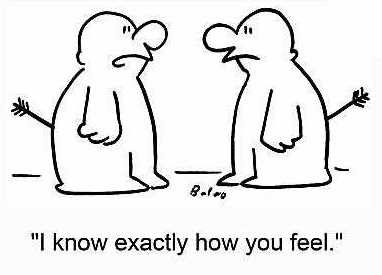Like and Trust – Connecting and Building Trust is part of the thought pattern to business success.
“I don’t know. This guy feels like a used-car sales person to me.” Oh those poor sales reps in the used car sales business. Their reputation sucks! When you are compared to a used-car sales person, people are really saying that they think they cannot really trust you. That you are at least lying by omission… In the opinion of the average person, used-car sales reps have low character integrity due to a low score on dimension 1: the ability to connect with others, and build trust.
Character Dimension 1: the ability to connect with others and build trust
This dimension is a combination of
“The other person understands, that you understand” (empathy) and
“I feel I can trust the other person” (trust)
 Let’s assume that you are not at the pathological level of not caring anything about anyone, and not giving anything about the need to be trusted. Almost everyone would like to be liked and trusted, but most people then make some typical mistakes that erode the ‘like and trust’ they gain with others.
Let’s assume that you are not at the pathological level of not caring anything about anyone, and not giving anything about the need to be trusted. Almost everyone would like to be liked and trusted, but most people then make some typical mistakes that erode the ‘like and trust’ they gain with others.
It is really simple: if you don’t feel that someone understands you, and empathizes with you, your trust will not go beyond a certain level. Note that it is not just that you must value the need to understand others, you must also have the skill to convey that you care.
Have you ever met someone who immediately rejects all critique or dismisses all questions regarding his or her plans to move forward? If so, that someone gave you the feeling that you (and your views) were not taken serious. It is an example of a displayed lack of empathy.
Another example of a displayed lack of empathy is someone who actually might be caring, and very nice, but who doesn’t show that he or she cares so you now think of this person as curt or cold.
When a business coach is confronted with a leader that complains that he only gets the compliance of his employees, we check this dimension of like and trust, as leaders who fall short on this will only get someone’s compliance, not the passion. We then ask “tell me, as a boss, do you go beyond the ‘hi’ and ‘good morning’ with your people, how much do you truly connect with them?”
And when their response is: “I truly care, I have this wonderful benefits package for my employees…” they don’t get it. Yes, great that you care enough to give this wonderful benefits package. But that doesn’t mean you connect with them. Maybe it is just a calculated move on your side to attempt to keep employees longer, but nothing about their needs to be liked and understood.
The human heart will seek to be known, understood, and connected with above all else.
If you do not connect, the ones you care about will find someone who will…
So this dimension is very much about the involvement in the other, versus being detached. Being detached is one of the sins in this dimension. Think about the stereo typical joke where the husband is reading the newspaper or watching TV while the wife is talking and talking and the husband totally ignoring her. Guess what, he is detached from her. How far will a spouse go for someone who makes no attempt to understand and connect with where he or she is and what he or she is experiencing in the relationship?
By the way, it is said that a significant number of extra marital relations started with ‘I finally found someone who I could really talk with and who would listen’. They started innocent enough, but since the spouse was in detachment mode, and this friend was the only one who really connected, one thing lead to another…. If you do not connect, the ones you care about will find someone who will!
Another sin, the other way around, is ‘over-identification’; known as a lack of boundaries. Some parents make this mistake, when they hear some criticism on their kids. They will immediately personally be involved, as they feel it as an attack on them. Not only will they smother the child that sooner or later will fight to become independent, but they also give the clear message that when their children are involved, you cannot trust them to be reasonable.
By the way, don’t confuse this dimension with being introvert and extrovert. Yes, outgoing people have it easier to make new connections, but introvert people are often better at keeping them. This dimension is about how much you care, how much you show, and how much you can successfully communicate that you care and can be depended on.
To Trust means to be Careless
You have organized an event. Invited many friends and relationships; bought lots of food and paid for other preparations. They said they would come. And then… only one third of the people who had said they would be there showed up. Only a very few took the effort to send you a message to give you a heads up that they were not going to make it. There you are, in front of an almost empty room…
They broke your trust. In a small way maybe, but they did. They probably didn’t even realize they did…
Integrity, doing what you said you will do, is a big element of the Trust dimension. As is Respect for others’ people time and property.
Let’s get to the point. In order to be ‘Able to Connect’ you need
- To be in touch with emotions and feelings of both yourself and others
- Cannot be Detached
- Have good boundaries
- Have the ability to listen in a way that communicates understanding
- Opposite is Invalidation
And in order to be trusted
- You will Trust someone to the extent that you believe that this person can and will take care of you.
- An element here is the amount of Respect (treating people and property with care) as well.
If you are interested in the system to actually measure these dimensions, contact your compound coach, or else renehollebrandse@midatlanticstrategicservices.com
Series 3 – “How to develop thought patterns” by Rene Hollebrandse

